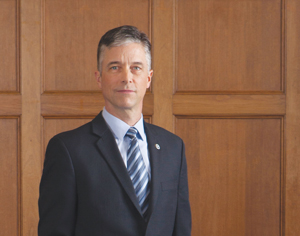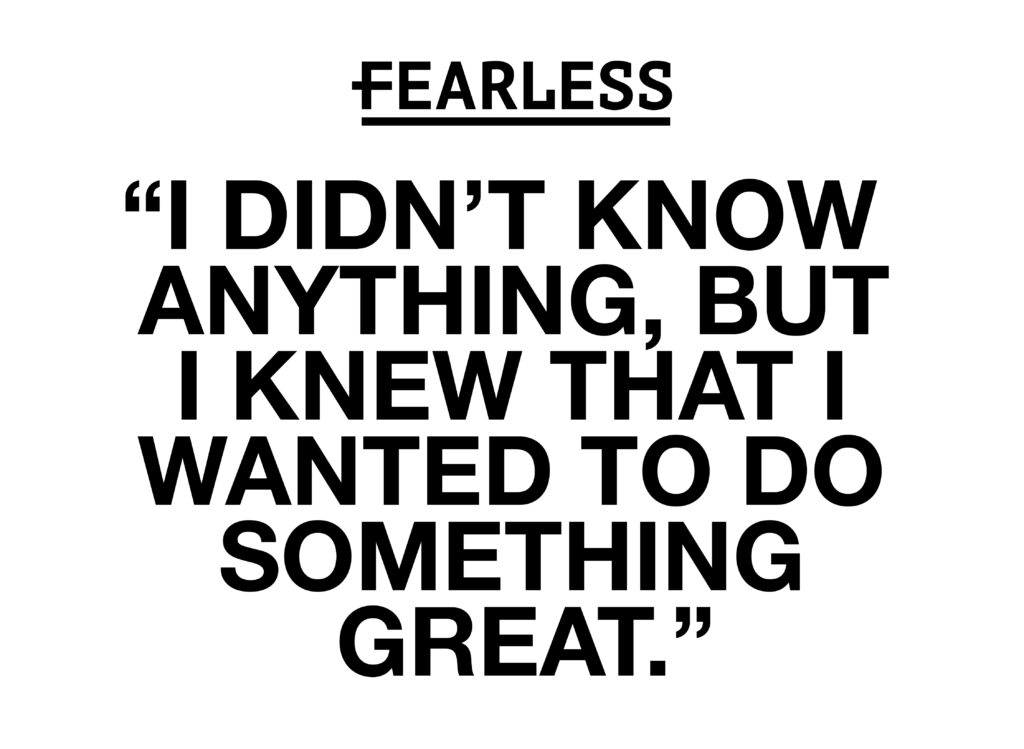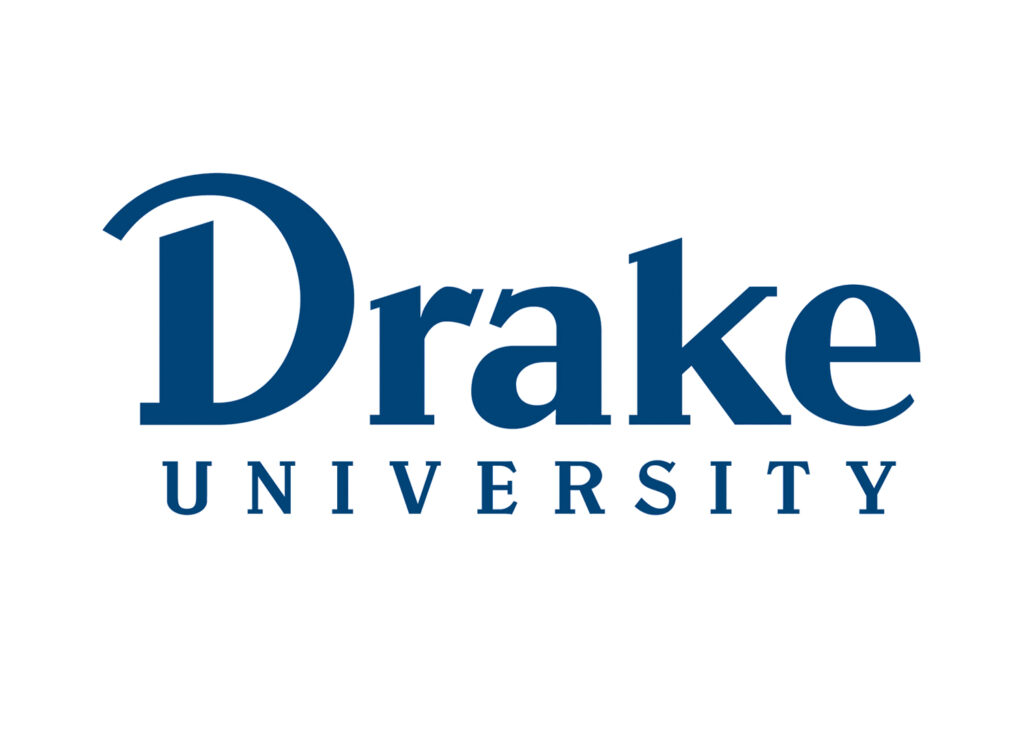A Closer Look: Marty Martin
President, Drake University

Marty Martin began his role as the 13th president of Drake University on July 1, following a nationwide search for a successor to the retiring David Maxwell. When the Business Record sat down to talk with Martin last week, he had just reached the midpoint of conducting 34 “listening post” meetings scheduled through this fall to meet and seek input from the university’s departments as well as from the Greater Des Moines community as a whole. A fourth-generation lawyer, Martin served for eight years in the U.S. Air Force as a legal officer, which honed his analytical and leadership skills. He later joined the faculty of Texas Wesleyan School of Law, where he worked his way from a visiting assistant professor to associate dean of the law school. Most recently, he was executive vice president of Gonzaga University in Washington, where he led the reorganization of the university’s support operations.
What have you learned so far from your listening tour?
It’s just discovering Drake and how we’re connected to the arts and the community. Everything that’s going on in Des Moines is really remarkable. The scope of the business community is phenomenal for a city this size, just in the sophistication and scale of what’s here. … I’m almost surprised by the depth and breadth of the arts community here. I’ve already seen a production at the Kum & Go Theatre. And it’s pervasive — the businesses seem to be really invested in the aesthetics of their spaces. I’ve reached out to Justin Mandelbaum and Des Moines Arts Project and how Drake can be connected to that. Right now I’m just like a kid in a candy shop; there is so much going on and so many opportunities.
Lessons you carry with you from Gonzaga?
I was at Gonzaga for 10 years; the first five as the law school dean. The last one of those five years I was also the acting academic vice president, so that year I was both the dean and academic vice president — which is kind of the equivalent of the provost — while we searched for a new AVP. It was in the middle of that year that the president asked me to become the executive vice president, which was a new position and division for Gonzaga. The idea was to bring together a vast majority of the support operations in order to make them more effective and efficient. I also oversaw a lot of capital construction projects, and that was fascinating. It also gave me exposure to the operations side, which you’re not going to get if you stay exclusively on the academic side. So that five years gave me a much better understanding than I could have ever gotten on a more traditional route to the presidency.
The other thing about Gonzaga that I really carry with me — and Drake has this as well — is this real student-centeredness, the focus on student preparation for success. You see that here at Drake when you look at the mission statement. The core of that mission statement is preparing our graduates for meaningful personal lives, professional accomplishment and responsible global citizenship. That’s how we define our success, so it’s a very student-centered focus. It’s the full experience — in the lab, on the stage, in student organizations, on the intramural field.
What do you enjoy the most about the president’s role?
The diversity of the job and the many things that you touch throughout the day. At the end of the day, you are the person who has the greatest oversight of all of the functions of the university. And if you’re doing the job well, you understand how all that intersects and relates to each other. Thus you, of course, drive those decisions to serve the entire organization the best — so you’re constantly balancing those needs and priorities. I like that part of the job a great deal. It’s almost the analogy of directing an orchestra — you try to make this beautiful music and it takes so many different participants and instruments to do so and you’re the person trying to direct these persons to this great outcome. It reminds me in many respects of teaching; that’s what you do in a classroom. In my own experience as a law professor, law classrooms are an incredibly interactive environment — you’re trying to bring the class along through this process of discovery.
What led you from a legal career into education?
Right out of law school I joined the Air Force JAG Corps. The vast majority of that time was spent as a trial attorney, first as a prosecutor and later as a defense attorney. When I moved to Germany in 1992 I became a circuit defense counselor, and the circuit was Iceland to Saudi Arabia. One year I was away 255 days. You have to be able to command a room and speak on your feet and adapt to the changes in the courtroom, so I think that experience prepared me well for teaching as well as representing the institution in public settings. It also gave me the experience of taking massive amounts of information as you’re sifting through a case and figuring out what’s really important and what needs to be communicated. That experience was incredibly formative to where I am today. The other thing I learned as a function of that Air Force experience is what it means to be a mission-driven institution. I really carried that with me; if you want an institution to succeed, you’ve got to constantly affirm the mission.
Tell me about your leadership philosophy and the type of leader you aspire to be.
You’ve got to be fully engaged and interested in the enterprise and its people and its work. Otherwise, it’s going to feel like nothing else but work, and you’re not going to perform at the level that the community deserves. I am incredibly passionate about this. I think the enterprise of higher education is incredibly important to the present and future of our communities. … The ability to thrive depends on a commitment to transparency, particularly in a higher education institution, because we are collaborators. There must be robust communication … and a real commitment and interest in the well-being of others. It all rolls up to being all-in; being here and now and serving Drake.
What is Drake’s biggest challenge as it moves forward?
Higher education generally is being disrupted. We’re seeing it on a number of different levels. On the undergraduate level, we’ve had four or five years of a downturn in the number of high school graduates, so that’s really created intense competition among schools to gain and secure enrollment. As those numbers now start to climb, it’s largely a function of students from lower socio-economic status who are challenged to afford higher education. So this has created an intensely competitive environment to recruit and retain students. We are not as vulnerable to it as some are because of the reputation we have, but nevertheless we’re experiencing that competition. So making sure that we’re right in that sweet spot of what we’re offering and its affordability (is important).
What’s your biggest challenge in becoming Drake’s president?
I’m never going to be wise enough; just the idea of wisdom. Wisdom is that combination of knowing the facts that are occurring and being able to assess the choices, but then really having the judgment to understand the best choice. That requires an awful lot of emotional intelligence as well as basic competence. I feel I’ve grown a lot in that regard, but I always want to get better. I want to develop even better patience than I have … to make sure I’m really listening deeply to what’s being shared with me.
What’s your approach to keeping a good relationship with the faculty?
Engagement. There are some structural features to Drake that are really advantageous in that regard. Gov. Bob Ray — I had lunch with him last week — during his year as president he started the practice of having the faculty senate president sit on the president’s council as a member of the senior leadership team. So he kind of opened up that doorway, and that’s a great credit to Gov. Ray and a great service to the institution because now we have a lot of faculty who have a deep understanding and appreciation of what it takes to run the institution. They’re just great emissaries to the faculty from the administration.
If you were at the end of your time as president, what would you want to be remembered as accomplishing?
The big headline, I hope, is that Drake University thrived. You always want to leave it better than you found it and better than it is now – stronger, more secure financially and delivering on our mission promise in every way possible.
What do you for fun as hobbies?
I like to play golf and tennis. I’ve only played Wakonda and (Tournament Club of Iowa) TCI, and TCI kind of crushed me. I don’t have the time to play as much as I used to. I like to bike so I brought my mountain bike, and I’m buying a new road bike that I’ve already picked out to ride on the paved trails.
How many times a week does someone ask you if you’re bringing the basketball expertise with you?
I’m a University of Kentucky undergrad and law school too, and being 10 years at Gonzaga some folks think I carry around some magic dust in my pocket. But we are really optimistic. Ray Giacoletti is absolutely the right coach for us. Jennie (Lillis Baranczyk) is just fantastic on the women’s side and no doubt there’s more to come there. And (athletic director) Sandy Hatfield Clubb really takes the idea of student athlete really seriously. She’s really committed to the success of these athletes on the field, but also in the classroom and in life.










